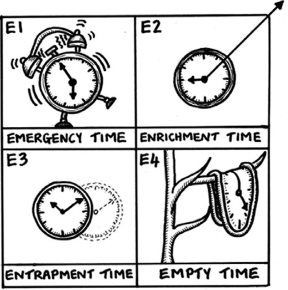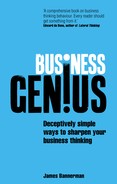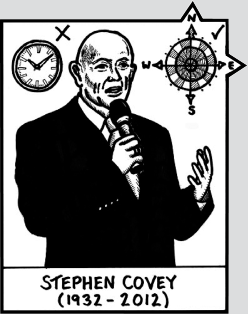The fifth Block and Limitation to Business Genius is unproductive time management.
The reasons for this are many and varied. However, here are the top two:
- We mistakenly think we can do everything.
(We can’t.) - We mistakenly think that time management is all about time.
(It isn’t.)
Time management is really about psychology.
It’s about our personal values (what’s most important to us), procrastination (our desire to put off the pain), and a rich tapestry of other psychological threads, too, from being over-fussy (perfectionism) to hopelessly dreamy (lacking in focus).
If we want to UP! our time management skills, we need to acknowledge there’s usually more to it than just asking for more concise reports, having stand-up meetings, or using the 4Ds (i.e. do now, do later, drop, delegate).
Ever noticed, for example, how some people always seem to do too much and always end up feeling overwhelmed?
Or how others almost succeed, and almost finish what they start, yet keep switching direction at the last minute instead of completing?
Well, according to Dr Eric Berne – who developed a style of psychotherapy known as Transactional Analysis back in the 1960s – this might not be entirely coincidental.
It could be because they have an always script, or an almost script.
Berne was curious why people kept doing things that seemed so blatantly against their self-interest. Why, for example, might someone lurch from one stressful job straight into another stressful job? It didn’t make sense. But then it started to make sense from a ‘script’ point of view.
Berne suggested that from the moment we’re born – to the age of about seven – we create a ‘pattern’, which helps us to make sense of ourselves, others and the world we live in. These patterns are what he calls ‘Life Scripts’, and we all have them!
Fortunately, however, because life is decisional, with sufficient self-awareness we have the power to change our script and write a better one.
Without this self-awareness, however, we can easily get locked into repeating the same old familiar pattern. Next time you tut to yourself, for example, you’ve probably gone into script, because tut = typical, and typical = been here before.
The reason I’m saying all this is because, on the face of it, it’s easy to assume that the person who feels overwhelmed – from a time management perspective – is overwhelmed because they’re doing too much. In script theory, however, it may be the opposite: perhaps the person is doing too much in order to feel overwhelmed, yet again.
Enough theory, though. Let’s move on to the practicals.
The key to productive time management is to remember psychologist Michael Altshuler’s mantra: ‘The bad news is time flies. The good news is you’re the pilot.’
That’s to say, what matters most with time is how we choose to spend the 86,400 seconds we have available in every day, and the 168 hours we have available in every week and, basically, we have four choices:
- Emergency time = immediate value.
- Enrichment time = residual value.
- Entrapment time = superficial value.
- Empty time = no value.
As you can see, it doesn’t take a Genius to work out where Business Geniuses usually choose to spend most of their time.
Of course there’ll be urgent deadlines that they need to meet from time to time (emergencies), and meetings they get drawn into attending, which turn out to be pointless (entrapments), but the bottom line is that Business Geniuses are very good at being the pilots of their own time.
Bill Gates, for example, could easily have loafed on the sofa aimlessly watching TV for much of his youth (empty time). By contrast, however, he chose to build up his business (enrichment time) and didn’t take a single day off for the whole of his 20s!
Now I’m not suggesting you go this far. On the contrary. Enrichment time can also mean spending quality time with your loved ones, or giving yourself a well-earned break (what Covey called ‘recreation’). All I’m saying is that Business Geniuses know busy-ness is not the same as business, and activity is not the same as achievement. What matters most is productive time management, and prioritising those non-urgent enriching activities that yield the greatest ROI …


UP! YOUR TIME MANAGEMENT
SKILLS NUGGET
Arguably the most successful time management Business Genius ever was Stephen Covey (the author of The 7 Habits of Highly Effective People and First Things First ).
Before Covey’s ground-breaking ideas were published in 1989 there weren’t very many books on time management, and of the few in existence they all seemed obsessed with the clock. When Covey and his colleagues arrived on the scene, however, they offered a very different approach: the compass. In a nutshell, what this meant was this:
During Covey’s effectiveness seminars, he’d put a large transparent vase on a table and then fill it with rocks. ‘Is it full?’ he’d say, and the audience would usually say ‘Yes!’.
Then he’d reach under the table and bring out some pebbles and pour them into the same vase. ‘Is it full now?’ he’d say. Once again he’d get a ‘Yes!’. But then he’d end up pouring in some sand, and finally water …
Covey would finish off by saying, ‘So what does that tell you about time?’ to which they’d answer something such as, ‘Regardless of how much you do, in your day-to-day life, there’s always more you can squeeze in.’ At which point he’d say, ‘No! That’s exactly what it isn’t about. Unless you fit the big rocks in first, how on earth can you fit them in later?’
And that’s the essence of his compass message (and something Business Geniuses do well). Work out your true North and prioritise that above all else, rather than getting caught up in the day-to-day ‘tyranny of the urgent’.

USEFUL TIPS AND
ESCAPE STRATEGIES
So if you want to UP! your time management, here are three practical tips and techniques that can help:
1 STOP DOING THINGS
It’s simply amazing how many Business Geniuses manage to achieve so much in such a limited period of time.
Look at Timothy Ferriss, for example (the author of The 4-Hour Work Week: Escape the 9–5, live anywhere and join the new rich). He worked out an ingenious way of delegating virtually everything he does, so he now makes far more money than he used to, doing far less work.
Or, how about the famous children’s author Enid Blyton? In her lifetime she evidently wrote 186 novels, 223 character books, 267 education books, 179 reaction books, 153 continuation books and 884 short story series.
Now – leaving a discussion about the quality of those books firmly to one side – the point is there’s no way she’d have been able to write them all if she hadn’t stopped doing others things!
So if it’s effective time management you’re after, keep on asking yourself what you could potentially stop doing because, as time management expert Jan Jasper makes clear: ‘Saying no to some activities is the only way you can say yes to what you really value.’
With this in mind, let’s just forget tips 2 and 3 …

BUSINESS GENIUS IN ACTION:
NEXT STEPS …
In summary, if you want to UP! your time management skills, here’s how:
- Pinpoint what is realistic and unrealistic time management (because you can’t do everything, and not everything’s worth doing).
- Investigate how time management is really all about psychology (otherwise it’s easy to assume that time management issues can automatically be fixed with a snazzy new time-planner, yet ‘Script Theory’ suggests it often runs deeper than that).
- Leverage the effectiveness of the 4 Es: emergency time, enrichment time, entrapment time and empty time (because – as Covey suggested – all actitivies can basically be divided up into four main categories, depending upon their varying levels of importance and urgency, and Enrichment time is the one that’s most likely to take us to new heights … for these are the big rocks!).
- Orchestrate a plan for becoming the PILOT of your own time (for, unless you take control of the 86,400 seconds in your day, almost by default, there’s every chance those 86,400 seconds will start to take control of you).
- Target what you’re going to stop doing (by remembering Jan Jasper’s pearl of business wisdom: ‘Saying no to some activities is the only way you can say yes to what you really value’).

UP!SPIRATION
‘Time stays long enough for those who use it.’
Leonardo Da Vinci

